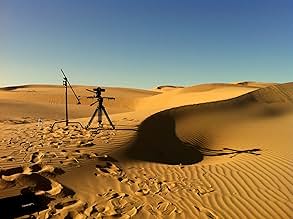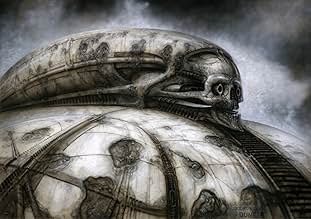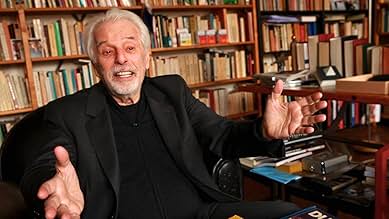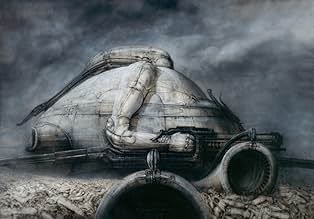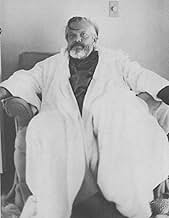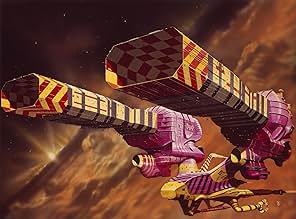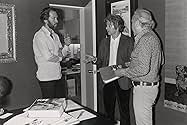AVALIAÇÃO DA IMDb
8,0/10
29 mil
SUA AVALIAÇÃO
A história da ambiciosa, mas condenada adaptação cinematográfica do romance de ficção científica do diretor de cinema Alejandro Jodorowsky.A história da ambiciosa, mas condenada adaptação cinematográfica do romance de ficção científica do diretor de cinema Alejandro Jodorowsky.A história da ambiciosa, mas condenada adaptação cinematográfica do romance de ficção científica do diretor de cinema Alejandro Jodorowsky.
- Prêmios
- 12 vitórias e 27 indicações no total
Douglas Trumbull
- Self
- (cenas de arquivo)
Dan O'Bannon
- Self
- (cenas de arquivo)
- (narração)
Pink Floyd
- Themselves
- (cenas de arquivo)
Salvador Dalí
- Self
- (cenas de arquivo)
Avaliações em destaque
I couldn't resist the urge to paraphrase the Tenacious D lyric for this review's title, cause I can't imagine anything more fitting.
I watched this documentary in anticipation of Denis Villeneuve's Dune, trying to better understand why adapting Dune in film has been such a challenge. One answer I came away with is that the sheer magnitude, complexity and transcendental nature of the source material triggers the fantasy-turned-burden of creating the greatest film in the history of cinema. It's like the Dune film has been the holy grail of modern sci-fi filmmaking. Jodorowsky was the first to chase it and was - and still very much is - convinced he had it. If only those pesky studio execs could see past the director's unconventional M.O. and cough up the money.
Jodorowsky's passionate and fascinating retelling of this epic adventure in filmmaking alone is enough to fill the screen for the whole 90 minutes, but we also get regaled with a good amount of the original concept art, animated storyboards and music that give us a taste of the project's intended aesthetic. The testimonies of some of the artists involved in the project help ground this implausible-sounding tale to reality.
I don't think the documentary makes any attempt to be objective, so it shouldn't be viewed as a complete chronicle of how this ambitious project went down. It's more a character piece on Jodorowsky himself, as a - slightly unhinged, slightly megalomaniac - uncompromising visionary, who at that one point in history managed to recruit an "army" (his term) of avant-garde talent (a jaw-dropping list of huge names from all over the artistic world from Orson Welles to Mick Jagger, from Salvador Dali to Pink Floyd).
Jodorowski the person is intriguing and flawed in equal measures. He reminded me a lot of Ayn Rand's Howard Roark (The Fountainhead) in the way that he put his art before anything and anyone else, displaying hints of cruelty: he admits to subjecting his 12-year-old son to a 2-year punishing training regime in preparation for his role as Paul Atreides, then he casually uses rape and "not respecting" women as a metaphor for creating great art (a bit you'd think the director would have chosen to cut out so as to protect the old man in this otherwise hagiographical portrayal).
In all, it's well worth a watch, especially in light of 2020's Dune, but it's good going into it knowing what to expect and what not to expect.
I watched this documentary in anticipation of Denis Villeneuve's Dune, trying to better understand why adapting Dune in film has been such a challenge. One answer I came away with is that the sheer magnitude, complexity and transcendental nature of the source material triggers the fantasy-turned-burden of creating the greatest film in the history of cinema. It's like the Dune film has been the holy grail of modern sci-fi filmmaking. Jodorowsky was the first to chase it and was - and still very much is - convinced he had it. If only those pesky studio execs could see past the director's unconventional M.O. and cough up the money.
Jodorowsky's passionate and fascinating retelling of this epic adventure in filmmaking alone is enough to fill the screen for the whole 90 minutes, but we also get regaled with a good amount of the original concept art, animated storyboards and music that give us a taste of the project's intended aesthetic. The testimonies of some of the artists involved in the project help ground this implausible-sounding tale to reality.
I don't think the documentary makes any attempt to be objective, so it shouldn't be viewed as a complete chronicle of how this ambitious project went down. It's more a character piece on Jodorowsky himself, as a - slightly unhinged, slightly megalomaniac - uncompromising visionary, who at that one point in history managed to recruit an "army" (his term) of avant-garde talent (a jaw-dropping list of huge names from all over the artistic world from Orson Welles to Mick Jagger, from Salvador Dali to Pink Floyd).
Jodorowski the person is intriguing and flawed in equal measures. He reminded me a lot of Ayn Rand's Howard Roark (The Fountainhead) in the way that he put his art before anything and anyone else, displaying hints of cruelty: he admits to subjecting his 12-year-old son to a 2-year punishing training regime in preparation for his role as Paul Atreides, then he casually uses rape and "not respecting" women as a metaphor for creating great art (a bit you'd think the director would have chosen to cut out so as to protect the old man in this otherwise hagiographical portrayal).
In all, it's well worth a watch, especially in light of 2020's Dune, but it's good going into it knowing what to expect and what not to expect.
The story of cult film director Alejandro Jodorowsky's ambitious but ultimately doomed film adaptation of Frank Herbert's seminal science fiction novel.
This is the missing link of science fiction history. Between 1960 and 1980, the world of science fiction evolved from cheesy robots and mad scientists to something far more visionary. Other given credit are "Alien", "2001", "Star Wars" and others... but perhaps it was this film that never got made.
H.R. Giger? Dan O'Bannon? Orson Welles? This is an incredible story, and really bridges a gap. Those watching "Dark Star" today (2015) might think it is a rather silly film, but put back into tits context and influence, it may be a much bigger piece of history than many think. How big would "Dune" have been?
This is the missing link of science fiction history. Between 1960 and 1980, the world of science fiction evolved from cheesy robots and mad scientists to something far more visionary. Other given credit are "Alien", "2001", "Star Wars" and others... but perhaps it was this film that never got made.
H.R. Giger? Dan O'Bannon? Orson Welles? This is an incredible story, and really bridges a gap. Those watching "Dark Star" today (2015) might think it is a rather silly film, but put back into tits context and influence, it may be a much bigger piece of history than many think. How big would "Dune" have been?
If you love Sci-Fi films, you have to see this. Or no: If you love films you have to see this. Even better: If you love art in general, you absolutely have to see this. This documentary had me grinning at first and drop my jaw soon later; the grinning was induced by the witty, charming narration by Alejandro Jodorwsky himself (a natural born story teller, if there ever was one) – the jaw dropping came by way of hearing the most incredible anecdotes about how one person got some of the most famous and daring pioneers of their respective arts to participate in one single project: Jodorowsky's 'Dune'.
In 1975, Alejandro Jodorowsky got a group of "warriors" together to make the film version of Frank Herbert's 'Dune', and the way he did this (or the way he tells he did this) is so outright unbelievable and entertaining that it simply must be true (actually, there's an amazing story for another film right there). Can you imagine Salvador Dali, Orson Welles and Mick Jagger all starring in a Science-Fiction film scored by Pink Floyd? Watch this Documentary if you want to know how this - nearly - came about. Or did you know that Dan O'Bannon, Moebius, H.R. Giger and Chris Foss all made fantastic designs for a Science-Fiction film that was NOT 'Alien'? Watch this documentary If you like to know more.
Telling the story of arguably the most influential Sci-Fi film never made, this documentary is a pleasure to behold and essential viewing for Sci-Fi geeks, film fans and lovers of art alike. 10 stars out of 10.
Favorite Films: http://www.imdb.com/list/ls054200841/
Lesser-known Masterpieces: http://www.imdb.com/list/ls070242495/
Favorite Low-Budget and B-movies: http://www.imdb.com/list/ls054808375/
Favorite TV-Shows reviewed: http://www.imdb.com/list/ls075552387/
In 1975, Alejandro Jodorowsky got a group of "warriors" together to make the film version of Frank Herbert's 'Dune', and the way he did this (or the way he tells he did this) is so outright unbelievable and entertaining that it simply must be true (actually, there's an amazing story for another film right there). Can you imagine Salvador Dali, Orson Welles and Mick Jagger all starring in a Science-Fiction film scored by Pink Floyd? Watch this Documentary if you want to know how this - nearly - came about. Or did you know that Dan O'Bannon, Moebius, H.R. Giger and Chris Foss all made fantastic designs for a Science-Fiction film that was NOT 'Alien'? Watch this documentary If you like to know more.
Telling the story of arguably the most influential Sci-Fi film never made, this documentary is a pleasure to behold and essential viewing for Sci-Fi geeks, film fans and lovers of art alike. 10 stars out of 10.
Favorite Films: http://www.imdb.com/list/ls054200841/
Lesser-known Masterpieces: http://www.imdb.com/list/ls070242495/
Favorite Low-Budget and B-movies: http://www.imdb.com/list/ls054808375/
Favorite TV-Shows reviewed: http://www.imdb.com/list/ls075552387/
This documentary tells the story of director Alejandro Jodorowsky's unfinished masterpiece: his attempt to produce a film adaptation of Frank Herbert's sprawling science-fiction novel 'Dune' in the mid-1970s -- a project which was never completed, in part because it collapsed under the weight of the director's incredibly ambitious vision for the movie. It was to have been a larger-than-life epic, as grand as Stanley Kubrick's '2001.'
All that survives of Jodorowsky's 'Dune' are the script, storyboards, and concept artwork. Using these, combined with talking-heads interviews of those involved, the documentary tries to show us how the finished film would have looked.
What makes all this so captivating are the interviews with Jodorowsky himself, and his incredible passion as he recounts the tale of an unfinished project from 40 years ago. Entering into Jodorowsky's world is like falling into a visionary dream where anything and everything is possible. And as his vision progresses, it becomes more and more ambitious: Salvador Dalì, Mick Jagger, and Orson Welles agree to star. Dan O'Bannon and H.R. Giger will design the sets and costumes. Pink Floyd will provide the score. It's hard to imagine a more ambitious movie, considering the technical limitations of the time.
Yet, as the documentary shows, the ripples from this never-completed, ahead-of-its-time film spread out in many directions, inspiring different ideas that made their way into later films such as 'Star Wars' and 'Alien' -- and which continue to inspire filmmakers today.
All that survives of Jodorowsky's 'Dune' are the script, storyboards, and concept artwork. Using these, combined with talking-heads interviews of those involved, the documentary tries to show us how the finished film would have looked.
What makes all this so captivating are the interviews with Jodorowsky himself, and his incredible passion as he recounts the tale of an unfinished project from 40 years ago. Entering into Jodorowsky's world is like falling into a visionary dream where anything and everything is possible. And as his vision progresses, it becomes more and more ambitious: Salvador Dalì, Mick Jagger, and Orson Welles agree to star. Dan O'Bannon and H.R. Giger will design the sets and costumes. Pink Floyd will provide the score. It's hard to imagine a more ambitious movie, considering the technical limitations of the time.
Yet, as the documentary shows, the ripples from this never-completed, ahead-of-its-time film spread out in many directions, inspiring different ideas that made their way into later films such as 'Star Wars' and 'Alien' -- and which continue to inspire filmmakers today.
A group of talking heads sit down to chat about the "most ambitious sci-fi epic never made." Which, I realize, sounds like some rather exaggerated, overplayed hyperbole. Thing is, between the director's intense dedication to the project and remarkable eye for talent, it quickly seems like a pretty reasonable statement. Alejandro Jodorowsky, who single-handedly provides much of the documentary's narration, is both the best and the worst thing to happen to this launchpad-implosion of a film. His confidence can often come off as egotism, and his absurd track record quickly turned off any potential Hollywood suitors (ultimately damning the picture) but in retrospect there's no arguing with the impact his hand-picked team made on the world of science fiction at large. Then-unknowns like HR Giger and Mbius would go on to enormous careers, both in the cinema and art scenes, while many of their collaborators found themselves poached for future hits like Star Wars and Alien. There's a certain irrational appeal to the man himself, which immediately comes through in his speech and mannerisms. It's no wonder major celebrities like Pink Floyd and David Carradine would attach themselves to the project, mingling with brow-furrowing supporting acts like Orson Welles and Salvador Dali. The big question of how the film could make the translation from eccentric paper-bound concept to vivid on-screen special effect (in a pre-Lucasfilm world, no less) is never adequately answered, and that hurts in the long run, but as an exercise in unbridled, unhinged creative discharge it's fascinating. Utterly tripped-out, surreal and nonsensical at times, but fascinating.
Você sabia?
- CuriosidadesHollywood studios would only let Alejandro Jodorowsky make the film provided that it would be 1h 50 mins long. Jodorowsky declined, reportedly stating that he wanted to make approximately a 15 hour long film. This is a common misconception- he never planned that the actual movie was going to be 15-20 hours, he made this statement in a fit of passion that his artistry would not be confined or compromised by a running time restriction (the studios were asking for 90-120 min running time for profit reasons) asserting that he will make the film as long as he wants it to be, and not because some suit wants more money. While the "Dune Book" being a massive tome; held a script, a full storyboard, and numerous conceptual designs and art work with a budget breakdown it's easy to assume and misconstrued that the finished product would have been over 12 hours.
- Erros de gravaçãoJodorowsky confuses the timing of events when he talks about going to London to see the members of Pink Floyd would do a score for the film. This would have in the mid 70s, since he said he had decided to contact Dan OBannon to come work on the project after seeing Dark Star (released in 1974). But he said Pink Floyd were working on Dark Of The Moon. However, that was released in 1973, too early to fit. It would be more likely they were finishing Wish You Were Here, released in1975.
- Citações
Alejandro Jodorowsky: What is the goal of the life? It's to create yourself a soul. For me, movies are an art... more than an industry. And its the search of the human soul... as painting, as literature, as poetry. Movies are that for me.
- ConexõesFeatured in Half in the Bag: 2014 Movie Catch-up: Part 2 (2014)
Principais escolhas
Faça login para avaliar e ver a lista de recomendações personalizadas
Detalhes
- Data de lançamento
- Países de origem
- Centrais de atendimento oficiais
- Idiomas
- Também conhecido como
- Jodorowsky's Dune
- Locações de filme
- The Domes, Casa Grande, Arizona, EUA(Scenes deleted)
- Empresas de produção
- Consulte mais créditos da empresa na IMDbPro
Bilheteria
- Faturamento bruto nos EUA e Canadá
- US$ 647.280
- Fim de semana de estreia nos EUA e Canadá
- US$ 36.018
- 23 de mar. de 2014
- Faturamento bruto mundial
- US$ 662.736
- Tempo de duração
- 1 h 30 min(90 min)
- Cor
- Mixagem de som
- Proporção
- 1.78 : 1
Contribua para esta página
Sugerir uma alteração ou adicionar conteúdo ausente







